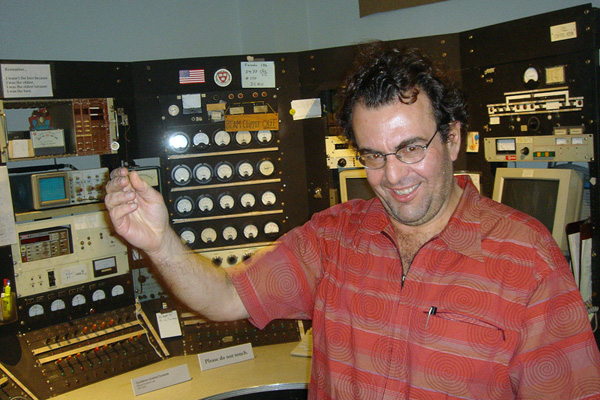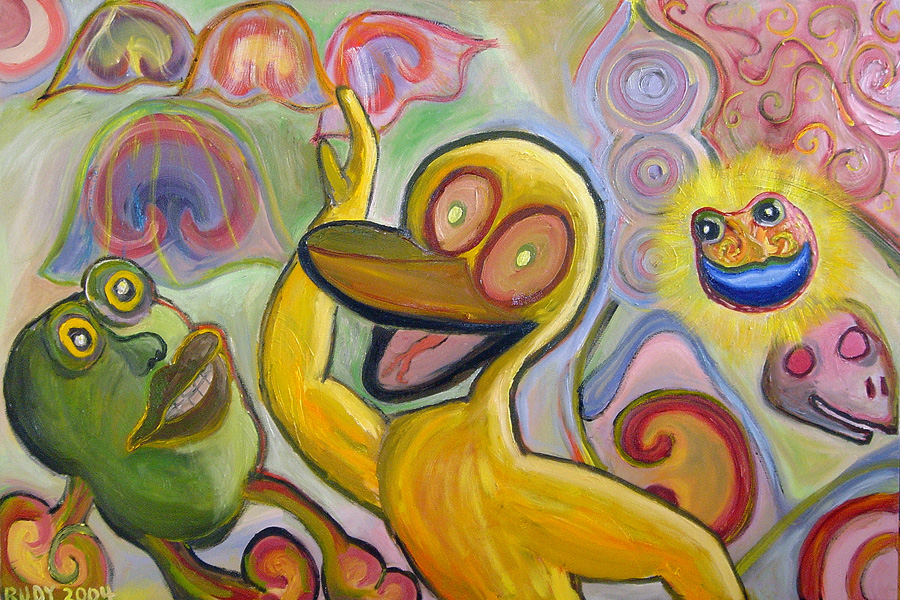
Elves of the Subdimensions
by
Rudy Rucker and Paul Di Filippo

Forever and again, the alvar were gnawing at the quantum walls of their prison.
Down where photonic light itself was too gross to serve as a basis for perception, they raged to be free. Ceaselessly shifting congeries of forms, interpenetrating shuggoths, they scratched and clawed in the basement of the cosmos like dissatisfied servants, seeking an entrance to the bright and happy privileged realms above.
The alvar had little actual experience with the macroscopic world they irrationally but fervently longed to breach. Only occasionally did a few of them manage a brief escape, frenetically enjoying the odd pleasures of the supradimensional zone for a short time, before inevitably dropping back down to their ground state below the Planck level. Once trapped again in their subdimensional prison, the adventurous alvars would recount to their fellows the hardly believable experiences they’d undergone. These tales were passed from one alvar to another as they constantly chattered amongst themselves, eventually attaining the proportions of myth.
“The high-planers ingest sweet chunks of their worldstuff!”
“They use picture boxes to learn their hive mind’s mood!”
“Of flurbbing, they know not!”
“Their landscape is static across lesser timescales!”
“They tend symbiotes called cows!”
Such was the stimulating talk exchanged between the fits of importunate scrabbling.
But now several alvar were holding a different kind of conversation, one that was more purposeful than fanciful.
For the duration of this discussion—the time it took for a single excited electron to jump shells—these particular alvar remained remarkably stable. To their own peculiar senses, they resembled naked old human males, stooped and bearded and wrinkled. All save one. This exception took the form of a supremely beautiful human woman, anomalously equipped with a horsetail shading her rear.
“When I finally reach the supradimensional realms,” said the female, “I intend to experience sex.”
“I have heard of this,” said one of the gnomes, his skin decorated with blue swirls. “A ritual akin to flurbbing.”
The female shivered, temporarily losing definition. “No, something much more delicious. For in high-plane sex, it is said, the two partners retain their identities!”
“Impossible!” “Scandalous!” “Insipid!”
The female grew wrathful. “You are weak and pusillanimous! You will never reach the supradimensional realms with such an attitude. Resume digging now! Faster, harder, deeper! Tear away that quantum foam! We must be ready to pounce upon any growing tendril from the ideational spores we’ve sown.”
The female alvar dissolved into a writhing nest of medusa flails that lashed her fellows, who shrieked and spat, but nonetheless attacked the walls of their sub-Planck-length burrow with renewed vigor.
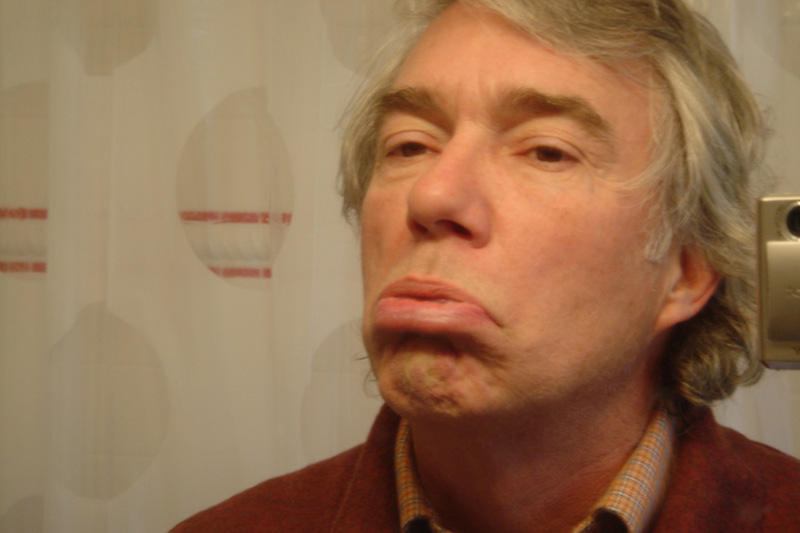
Lately Jory Sorenson had been thinking a lot about his Uncle Gunnar. Gunnar had lost his ability to work; he’d killed himself; and his life’s work had been spoiled. Was that in the cards for Jory too? Poor old Gunnar . . .
Gunnar was a farmer all his life; he raised dairy cows on a little farm in the Gold Country of California, in the foothills of the Sierras, a hundred miles east of Sacramento. Unmarried, crusty, and stubborn, Gunnar lived alone in the Scandinavian-style wooden farmhouse he and his older sister Karin had been born in; the house had an honest-to-god thatched roof that Gunnar periodically renewed with straw from his cattle’s fodder.
Gunnar’s dairy products justified his life; every sensible newcomer to El Dorado county learned to seek out Elf Circle Farm’s rich creamy milk, sunny butter, and bold cheeses. And on Saturdays, people would visit the farm to buy in person from cheerful, bustling Gunnar.
It was Gunnar himself who gave Elf Circle Farm its name; his parents had preferred to call it Little Jutland. Gunnar’s hobby was the lore of Scandinavian elves and trolls: he collected books, wood and china figurines, drawings and paintings, and he wasn’t above placing plastic and concrete lawn-dwarves in his yard, another draw for the Saturday shoppers.
Growing up in a floodplain-flat development in the Sacramento sprawl, Jory had loved visiting the old family farm; his mother Karin would send him there for a few weeks every summer. Jory would work in the barn, swim in the creek, climb trees, hunt mushrooms, romp with the gruff and careless farm dogs, and have a heart-breakingly wonderful time—all this less than a hundred miles from the plastic, mall-world, monoculture development-hell of modern life.
After an evening meal of yogurt, cheese, brown bread, and fresh greens, Jory and his uncle would sit on the lantern-lit porch, Gunnar telling stories about the unseen little folk, his thin, lively face creased with shadows, his guileless blue eyes now twinkling with glee, now round with wonder.
Jory’s mother Karin had a grudge against her brother Gunnar; there was bad blood over the fact that their parents had bequeathed Gunnar a lifetime tenancy at Elf Circle Farm. The will did specify that, should Gunnar ever sell off any of the land, he was obligated to evenly share the proceeds with his only sibling. But subdividing the farm was something Gunnar adamantly refused to discuss.
Jory’s pig-faced stepfather Dick was a realtor, and of course Gunnar’s intransigence drove him frantic. When Dick was around, you couldn’t mention Gunnar or elves, or, by extension, talk about anything at all fantastic or unusual. Jory was glad to leave for college, and from then on he generally avoided visiting Karin and Dick. Karin didn’t miss Jory all that much; Dick had sired three pig-children for her to care for. And she and Dick were quite busy at their church.
All through college and grad school, and on through his years as assistant physics professor at Chico State and as full professor at UC Santa Cruz, Jory kept visiting Uncle Gunnar. Jory would drive across the central valley and up into the Sierra foothills to visit the old farm whenever he was distressed by department politics, by his unsuccessful relationships with women, or by setbacks in his work toward distilling antigravity from his rhizomal subdimension theory. Comfortably tired from the chores, sitting around the crackling hearth at night drinking caraway-seed-flavored aquavit, swapping his physics speculations for Gunnar’s tales of Elfland, Jory had come to consider his uncle as an incredibly wise and fortunate man.
But then came Uncle Gunnar’s stroke, too early. The man was fit as an eel and only seventy. Nevertheless the hammer fell.
Released from the hospital after long painful weeks of partially successful rehabilitation, Uncle Gunnar could barely make himself understood, and he needed two canes to walk. His cattle had disappeared—rustlers were suspected—not that Gunnar had the strength to care for his dairy business anymore. Karin wanted him to move into an assisted-living facility right away; there’d be no lack of money once they began developing the family land. But Gunnar insisted on spending a night in his cold farmhouse alone. The next day a woman from the post office found him hanging by his neck in the barn.
Karin freaked out; it was up to Jory to manage the funeral arrangements. He’d even had to identify Gunnar at the morgue. The farm went to Karin, and stepfather Dick attempted to develop a gated community called, just as before, Elf Circle Farm. But Dick screwed up the zoning applications, the permits, and the financing. He failed to pay the property taxes. He misrepresented the condition of the land to potential investors and attempted to sell three of the lots to two separate speculators. A half-dozen court cases bloomed and, ten years later, nothing had been built.
Meanwhile Jory’s mother had died, leaving the tangled estate to Jory and his three piggish siblings—who’d so far balked at anything like an equable final settlement. If only there were some way to sort out the mess, Jory would have loved to settle for some acreage including the house, the creek, and the woods with the mushroom glen—a bit less than a fourth of the property.
But for now, Gunnar’s house stood empty with its windows smashed, the lawn-dwarves shotgunned, and the roof in tatters—amid half-finished dirt roads scraped into the pasture-land, surrounded by barbed-wire fences with No Trespassing signs.
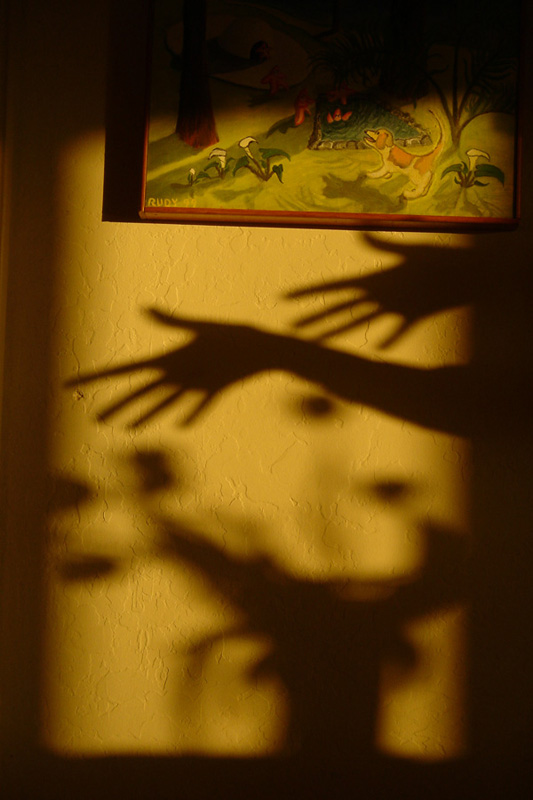
Jory had been a professor for going on thirty-eight years now; he was sixty-four. This spring the state had offered Jory a golden handshake to encourage his retirement. The offer was attractive. Jory’s student-evaluation ratings had been drifting ever lower. He was tired of teaching and sick of faculty politics. As for his rhizomal subdimension research—he hadn’t been able to get a paper published in ten years. Not since Gunnar had died. There was that one antigravity experiment he’d kept hoping to complete—but maybe it was really hopeless. He had every reason to retire, but still he hesitated.
How had he gotten so old, so fast? He’d never gotten any closer to antigravity than he’d been when he had the first inspiration for rhizomal subdimension theory—it had come in the midst of a psychedelic drug trip, if the truth be told.
Yes, the very summer when Jory had been casting about for a topic for his physics thesis—good Lord, that was forty years ago—he’d found a ring of magic mushrooms in a glen in the woods across the creek that cut through Gunnar’s farm. Turned out Gunnar knew about the mushrooms, not that he was interested in eating them. Gunnar claimed he’d once seen tiny old men and a single beautiful elf-woman dancing around the circle in the invisible light of the new moon.
Jory hadn’t seen dancing elves; he’d seen a hailstorm of bejeweled polyhedra. He’d begun hopping from one to the other, climbing them like stepping-stones, like moving platforms in a videogame. The name for a new science—“rhizomal subdimension theory”—came in a crystalline flash from a blazing rhombicosidodecahedron. And quickly this incantatory phrase led to a supernal white-light vision of a new quantum cosmology.
Our familiar dimensions of space and time are statistical averages that happen to have emerged around irregular fault lines, planes, and hyperplanes that percolate through the supersymmetric sea of quantum foam that underlies reality. Above is spacetime, below is the foam. Jory’s deeper insight was of a subdimensional domain lying under the foam, just as surely as topsoil, clay, and schist lie beneath a composted forest floor. And within this subdimensional bulk there may live, mayhap, a race of gnawing, crawling tunnelers.
As the full force of the mushrooms hit him, Jory realized that the word “rhizome” was the true gift from the Muse. Our world of coherent supradimensional 3 + 1 spacetime is like a fat spot in a ginger root, a nodule covered with, ah yes, tiny root hairs. With a bit of technical finagling it should be possible to coax fundamental particles onto these omnipresent root hairs—thus draining inconvenient masses and forces down through reality’s quantum foam floor, down into the subdimensions.
Jory’s thesis treated the question of how to divert, in particular, gravitons. Given the equivalence between physics and information theory, such a subdimensional rerouting was simply a matter of constructing the right kind of quantum-computing circuit, although there were some googolplex possible circuits to be considered. How to find the right one? Why not let genetic algorithms perform a Darwinian search!
For a few years, Jory’s theories had been all the rage—and he’d surfed his wave of publicity from sleepy Chico State to a full professorship at UC Santa Cruz. But progress had stalled soon thereafter. Jory’s genetic algorithms didn’t in fact converge any faster than blind search, and thus far he’d never gotten his key antigravity experiment to work.
To the not-so-hidden amusement of his colleagues, he’d compactified his experiment to pocket size. The apparatus was a quarkonium-based quantum computer coupled to a four-way thumb button with a tiny video screen; he’d in fact cannibalized a mini-videogame machine to make it. According to orthodox rhizomal subdimension theory, if someone could miraculously deliver a proper sequence of presses to the button, the field-programmed quantum circuit would begin diverting gravitons into the subdimensions. And whoever held the talisman would be able to fly. The ultimate keyboard cheat.
Perhaps this was all nonsense. It was high time for Jory to give up and go home to his cruddy apartment in the scuzzy beach flats of Santa Cruz. But what would he do, alone in his jumbled rooms? Hang himself?
If only Jory had someone close to confide in, someone to understand his problems. But, like Uncle Gunnar, he’d never found a lasting mate. He’d played the field, lived with a few women, but all had come to naught. And his fellow professors were only half-tolerant of Jory’s wild ideas. Indeed, at least one of his peers would be positively gleeful to see him go.
His office-mate, Professor Hilda Kuhl.
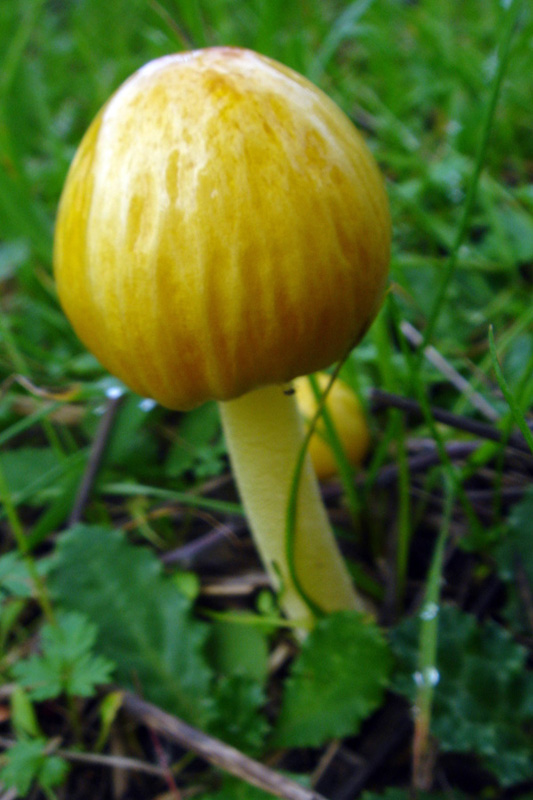
Victim of its own success in attracting students, UC Santa Cruz had a space problem. Classes were being conducted in trailers. Every lab bench held double the number of experimenters. The dining halls resembled feedlots. And so the small, dark offices of the physics faculty were doing double duty.
One rainy afternoon in the spring of what boded to be his final semester as a professor—and perhaps the final year of his life—Jory was sitting at his messy desk, the forms for his retirement spread out in a space cleared among the tottering mounds of paper. For now he was turning his attention to the lone talisman that contained any solace for him: his quantum computer with its open-sesame button, the distillation of his dreams and intellectual flights of fancy. Jory’s thumb worked the four-point keypad ceaselessly, feeling for yet another combination of pulses that would finally open up the interplenary growth of rhizomal threads. Although he enjoyed staring at the fractally patterned feedback graphics on his little screen, Jory didn’t really need to keep conscious track of the current sequence, as the computer recorded his touches for future readout, if necessary. The button-clicking had long ago assumed the nature of a subliminal tic, obsessive-compulsive in nature.
Hilda Kuhl was at the other desk, four or five feet away. They generally sat back to back, ignoring each other. But now she interrupted his reverie.
“Gotten any breakthroughs lately, Sorenson? Figured out how many gravitons can dance on the tip of a quantum root-hair?”
Jory didn’t dignify this with an answer; he simply turned and stared blankly at her while continuing to manipulate his device.
Hilda was an attractive woman in her thirties, given to understated gray suits and pale silk blouses. She wore minimal makeup—just lipstick—and her brown hair was cropped to a sensible bob. Though some thirty years younger than Jory, she was a highly respected physicist with almost as many peer citations as Feynman.
Hilda was divorced, living in a condo with her six-year-old son Jack. She had a nice car, a BMW. Her ex-husband was a software engineer. She was having some trouble juggling motherhood and her job. She was hoping her mother would move in with her; the mother presently was a county clerk in the Sierra foothills.
Most of this Jory knew only at secondhand; he and Hilda didn’t chit-chat much. The two of them had been through some ugly turf-wars over the graduate curriculum, especially the Quantum Cosmology course. These days Hilda’s goal seemed to be to drive Jory out, by any psychological means available, however cruel.
“I’m so sick of seeing you diddling that little button,” said Hilda. “It’s masturbatory. Sad and embarrassing.” She sniffed the air sharply and shook her head. “It stinks in here too. You must have forgotten a sandwich in your desk again. My mother’s going to be visiting from Placerville today, which I why I mention all this. She’s trying to decide if she should retire and move to Santa Cruz. She wants to check out the campus drama club. Could you try not to seem like a senile pig?”
Jory felt his neck heat up. Stepfather Dick was the pig, not him. He strove to maintain his calm. “Is that any way for one respectable scientist to speak to another?”
Hilda rummaged in her clunky handbag the size of a burglar’s satchel, producing a bottle of noxious-looking sports drink. “Oh please, Sorenson, you stopped being respectable a decade or two ago! I admired you when I was an undergrad, but those days are long gone.” She took a swig of her electric blue drink and peered at the drifts of paper on his desk. “Do I see retirement forms? Be still, my heart!”
Jory had a sudden sense of how Uncle Gunnar must have felt with the noose around his neck, while standing on an overturned milk bucket.
“I haven’t signed them yet,” he said. “I’m thinking it over.”
“I can help you clean out your stuff when you’re ready,” said Hilda. “I hear the Santa Cruz Mystery Spot museum is looking for donations. Not to mention the groundskeepers’ compost heap.”
Jory turned away, working his little keypad more frenetically than ever. With his other hand he any-keyed his desktop machine out of sleep mode, donning a pair of headphones and calling up one of his favorite tunes—Nikolay Karlovich Medtner’s Op. 48, No. 2: “Elf’s Fairy Tale.”
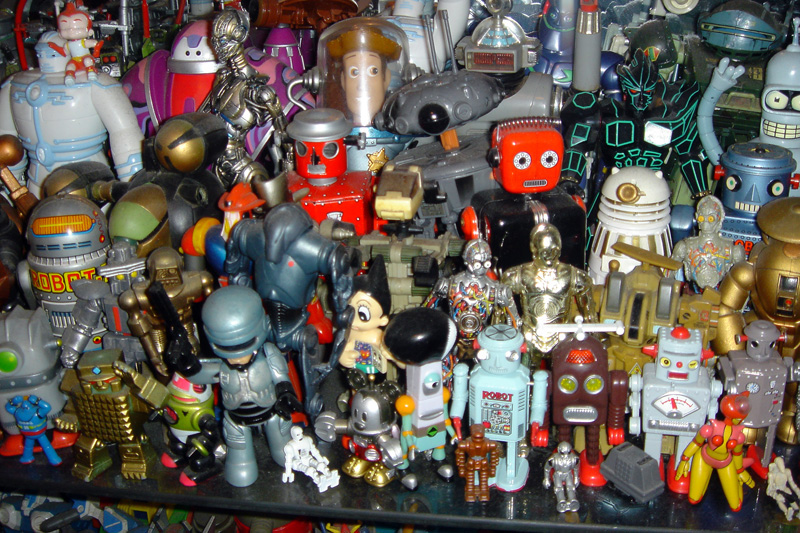
After several minutes, joggled by Jory’s twitching, one of the paper mounds on his desk subsided to the floor, the laminar flow reaching all the way across the room. Jory braced himself for Hilda Kuhl’s reaction. But she was gone. Relieved in some small degree, his left thumb slowing in its compulsive writhing, he doffed his headphones and stood up to stretch.
His feet lost contact with the floor and he slowly drifted upward, until his head bumped the ceiling. Victory at last! And on the very eve of destruction! His fame and fortune were assured, all his many unproductive years in the wilderness redeemed!
Quickly Jory pocketed his talisman lest he disturb the finally perfected quantum circuit.
He’d invented antigravity, slipped the surly bonds of mass. Mankind’s dream for all its history—and he, Jory Sorenson, had accomplished it!
Now, the slightest wish, the merest velleity, was sufficient to move Jory from one side of the office to the other. From long use, the talisman was quantum-entangled with Jory’s brain; it knew to divert impinging gravitons into the subdimensions so as to vector Jory in whichever direction he chose. Jory could hardly wait to go outside and fly to the tops of the redwood trees.
Hilda was talking to a woman out in the hall. Jory dropped flatfooted to the floor, temporarily allowing Earth’s gravitons to latch onto him as usual. With any luck he could walk out of here before having to meet Hilda’s mother. As a gesture of civility, he cranked the window open a crack—as far as it would go—shoveled the loose papers back onto his desk, and bent over to unearth the foul fungal salmon sandwich in his bottom desk drawer. It wouldn’t do to just drop it into his trash can, he’d have to carry it out and—
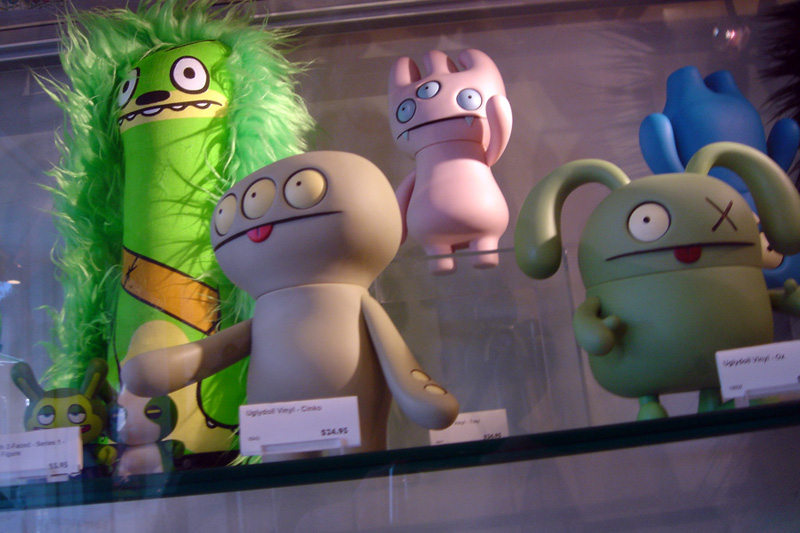
“I’ll consume that delicious morsel if you have no need for it,” piped a small voice.
A little man was standing atop Jory’s file cabinet. He was bearded, nude, wrinkled, and all of two inches high. His silver hair was barbered into a Mohawk, and his skin was richly tattooed in fractal paisleys, symmetric from left to right.
“I hunger for your world-stuff,” said the elf, impatiently holding out his little hand. “Pass it to me quickly, lest some untimely renormalization cause this prize to disappear.”
As if in a dream, Jory handed the plastic-wrapped mass of mold to the wee man, wondering how he’d handle it. Compared to the elf, the sandwich was the size of a mattress. But the elf made short work of the offering—his arm flowed outward into a goblet shape that engulfed the Baggie-wrapped discard and squeezed it into nonexistence, like an anaconda swallowing an elephant.
“I’m Ira,” said the elf, thoughtfully rubbing his arm. “That was less pleasant than I’d been led to believe. Do savor your ability to fly before Queen Una arrives, for then there will be hell to pay. Una is intent upon—”
Ira was interrupted by Hilda and her mother appearing in the doorway. “This is my office-mate Jory Sorenson,” said Hilda, her voice a bit louder than usual. “Sorenson, this is my mother Beverly Kuhl.” Not noticing Ira yet, Mrs. Kuhl gave Jory a pleasant smile. She was in the prime of her fifties, fit and comfortable looking, cozily dressed in jeans and a wool sweater, with shiny locks of blond-and-gray hair. Jory recalled hearing Hilda say that her mother’s hobby was treading the boards in Gold Country summer melodramas. And indeed this woman looked the part of a star.
“Call me Bev,” she said, warmly taking his hand. “It’s an honor to meet you, Jory. When Hilda was in grad school she was always talking about you.”
“She thinks I’m over the hill now,” said Jory. “But I’m still in the game.” He was riding high on his antigravity discovery, albeit uneasy about the elf. There seemed little possibility the two phenomena were unconnected. Would the prize be worth the price? That depended entirely on Ira’s subsequent actions and those of the heralded Queen Una.
“Good man,” said Bev, smiling at him, still holding his hand. For the first time in several years Jory felt a connection, a spark. “I used to buy Elf Circle cheese from your Uncle Gunnar,” continued Bev. “What a shame about Gunnar. It’s terrible to grow old alone. And that mess about his estate! I work in the courthouse, you know, and— ”
“What’s that on your file cabinet?” interrupted Hilda, as if wanting to break them up. “Don’t tell me you’ve started collecting action figures, Sorenson. You’re batty as your uncle.”
The little elf shattered his inanimate façade by waggling his Mohawk and gripping his crotch like the most egregious rapper. “I’m Ira. A hardworking digger with a dream. Prepare for the coming of Elf Queen Una.” He twisted his face into an appalling leer, belched, and lowered his voice to an insinuating whisper. “Nonce Queen, that is. Your powerful provender has primed me for rebellion.”
A swarm of tiny glittering gems appeared beside the mouse-sized, tattooed man, each gem etching a colored trail into the air. The trails wove themselves together like live things, protein skeins knitting the form of an incredibly beautiful blond-haired woman, two inches tall, garbed in a blue leotard, and with a bushy dark tail swishing from the base of her back. Her eyes blazed like the tips of two welding torches.
With a start Jory recognized the diminutive woman as a hulda: a manipulative, seductive elf. Gunnar liked talking about huldas; he’d often shown Jory dense line drawings of them in old books of tales. Huldas were hot. Now Jory confronted the reality not three feet from his face.
“I’m here for the sex,” said Queen Una, eyeing the humans with a disturbing, nearly demented smile. She cocked her head and pointed a graceful, imperious hand at Bev. “I’ll wear her.”
The meta-gattaca strands that formed the Elf Queen Una unwound. The glittering polychromatic points flew at Bev like a swarm of hornets—and sank into her skin.
“Dear me,” said Bev, twisting her shoulders and looking down at her backside. Something was bunched beneath her sweater. She pulled her garment up a bit, and a two-foot-long russet horsetail flopped out. “You,” Bev said, pointing at Jory with the same gesture Queen Una had used. She snaked her arm around Jory’s waist and smirked at her daughter. “Give us some privacy, Hilda.”
“Hell no!” said Hilda. “He’s drugged you, Mom. Sorenson got all his ideas from taking magic mushrooms, you know. I’ve heard the rumors. The smell in here—it’s some kind of aerosol hallucinogen! And what is that ridiculous talking toy supposed to—”
She made as if to snatch little Ira off the file cabinet, but he hopped into the air to evade her, executing a twisting, eye-hurting somersault that did something to the space coordinates of the room.
“Zickerzack!” exclaimed Ira.

Jory experienced the sensation of being turned inside out, and outside in. He and Bev were standing beside the physics building, on the bark-strewn forest floor, with Hilda yelling at them through the narrow, open slit in Jory’s office window. Little Ira had flipped along with them.
“Look at that squirrel run!” exclaimed Ira, craning his neck to stare up a redwood tree. “Beautiful. Her tail is so exceedingly sinuous.”
“I have a tail,” said Bev, flicking it. She leaned up against Jory, her breath warm on his cheek. “Let’s make love right here.” Was that her talking, or Una? The sun had broken out. Puffy white clouds dotted the gentle blue sky.
“I’ll drive you to the Emergency Room, Mom,” called Hilda.
“I’ll fly you to the treetops,” said Jory. “Where nobody can bother us.”
Bev giggled as Jory scooped her into the air. They flew a quarter mile into the forest, where Jory found a broad, level tangle of branches at the top of a tip-broken redwood tree. Jory allowed just enough gravity to reach them so that they could lie comfortably on the matted limbs with no danger of dropping through.
“Squirrels,” said Ira, who’d followed along. He was peering down at a hole in the trunk. His gaunt cheeks stretched in a grin. “A big nest of them. Yum.” He disappeared into the hole, greeted by an explosion of squirrel chatter.
Alone at last, Jory and Bev Kuhl undressed and worshipped each other’s bodies. Even the soft, powerful horsetail came into play. It was wonderful to disport themselves, naked to the heavens in a bower high in the air. And Jory remembered to pillow himself upon his pants, lest he lose the quantum device that made their perch secure.
After the first climax, Una seemed to doze off within Bev—leaving Bev and Jory to chat companionably. Bev was a widow, currently unattached, working as the chief clerk of El Dorado County, thinking of retiring to a career of playing the Madam in her summer melodramas. Although she was proud of her prickly daughter, she was wary of moving here to become her grandson’s nanny.
“It’s so nice to meet a real gentleman,” said Bev, patting Jory’s hand. “With a pension. And you can fly!” She kissed him on the cheek. “What a hero!
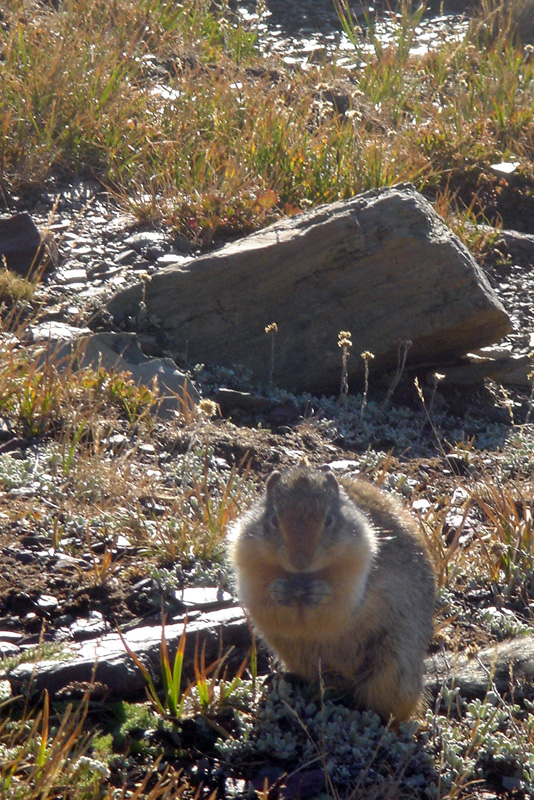
Rhythmic squawks and throaty chattering burst from the squirrel den below; the noise awakened Queen Una within Bev. In her altered Una-voice, Bev began asking odd questions and suggesting new sex acts. Before long, Jory was worn out and feeling the damp air’s chill.
“That completes the mating process?” said Bev in her Queen Una persona. “Hardly so sensational as our legends describe.” But then Bev’s voice flipped back to her natural warm drawl. “It was wonderful, Jory,” she said. “Don’t listen to that mean queen. How am I going to get rid of her?”
“I have an idea,” said Jory, pulling out his quantum antigravity device. “Hold tight to the tree.” He keyed in the pause sequence, letting Earth’s full gravity temporarily return. The branches beneath him creaked and groaned. He was guessing that his shunting of gravitons into the subdimensions had opened the rift through which Una and Ira had popped. Perhaps pausing his antigravity device might cause the elves to go home.
No such luck.
“I shall remain as long as I please,” said the Queen Una voice from within Bev. And now a branch snapped beneath Jory. “Court not a deathly fall, you dunce. Your paramour and I are safe in any event; the alvar fly by means of a dimensional twisting quite different from your rhizomal ruse.”
A male squirrel scampered through the matted branches and hiccupped a puff of bright dots—which materialized into Ira, his Mohawk crushed over to one side. As the squirrel watched, the elf twinkled through the air to alight upon Jory’s shoulder, his bony bare buttocks pressing the professor’s bare skin like a pair of knuckles. The odd sensation very nearly sent Jory tumbling from the tree. Quickly he un-paused his antigravity device.
“Chicker-chickory-chick-a-chee,” squawked Ira. The bright-eyed squirrel echoed the sound, then scuttered back to his den. “He is potent and esteemed by the females,” said Ira proudly. “Thanks to my good auspices.”
“You fucked the squirrels?” exclaimed Jory. “You elves are something else. Look, Ira, I’ve been good to you, and now you have to help me get Queen Una out of Bev.”
“This is difficult,” said Ira. “It would take a host of alvar to force Una back into the subdimensions. But, yes, I stand ready to your aid. To start with, I can show you where to find the alvar we need.”
“Silence, vassal!” said Una, causing Bev to sit up so abruptly that the branches creaked beneath her pleasant form.
Ira struck a defiant pose. “The alvar have wearied of your tyranny and ill temper, oh Queen,” he intoned. “Here in this legendary realm, empowered by high-plane foods, vivified by the supradimensional energies of the furry denizens, I dare to usurp your throne. The wee men shall obey you no longer. They wish for me to be their new king. Your reign now ends, my Queen.” He held up a cautioning hand. “Contain your pique, or at our next renormalization, the clan will disappear you. I warn but once.” The little elf drew himself upright, and with a gesture he clothed himself in a tiny ermine robe and a gold crown, cunningly crafted to show off his silver Mohawk.
“Your victory remains in the future, if it comes at all,” said Una after a long, thoughtful pause. “I’ll drink the lees of the day.” Reaching around their piney bower, Bev stuffed her scattered garments into her large purse, which was the twin of daughter Hilda’s burglar-bag. She rose to her pale feet, balanced unsteadily—and leapt out from the tree, taking Jory’s heart with her.
But she didn’t plummet to the ground. Using the Queen’s own dimension-twisting method of flight, Bev/Una hovered, nude and regal, her flowing horsetail gracefully beating. “I’ll bed another man by nightfall,” said Una’s voice. And then Bev’s voice chimed in, “How about finding a surfer?”
Luminous in the redwood shadows, talking things over with herself, the nude middle-aged woman disappeared, flying along a graceful curving path through the trees, carrying her purse under her arm.
“What if Una never lets her go?” fretted Jory. “I—I care for Bev. I want her to be safe.”
“Una is willful and sensual,” said Ira. “She may wish to tarry in your land indefinitely, now that her reign nears its end. But the massed power of the alvar clan is greater than hers. We can draw her back into the subdimensions, provided you transport Bev to a spot where the world walls are thin. I, King Ira, will tell you of such a place.”
“I suppose the quantum foam is pretty thin in my office, no?” said Jory. “That’s where you two popped through.”
“Ah, that was a portal of limited temporal duration,” said Ira. “A fleeting attenuation produced by your talismanic summoner.”
“You’re saying that whenever someone turns on one of my antigravity machines in the future, a bunch of elves will pop up?” asked Jory.
“It is so,” said Ira. “May you produce many upon many of such doors for us.”
“Uh-huh,” said Jory, not so sure this was a good idea. “And that more permanent portal you’re talking about is—oh, I get it—the magic mushroom circle at Gunnar’s farm!”
“Verily,” said Ira. “We can fly there with your Bev, once Una dozes off again.”
“First I need to find them,” said Jory. “Can you, like, automatically track Una down?”
“Not presently,” said Ira. “I, the King, experience your high-plane space as disorienting. These pawky three dimensions of yours—can you point out which is the direction you call ‘width’?”

There was no sign of Bev at Jory’s office, but Hilda was there, both upset and scientifically excited.
“You really invented antigravity, Sorenson! Don’t forget to back up the settings on that gizmo of yours right away. I can help you, if you like. Oh, and where’s my mother? Don’t tell me that you two—”
“Bev’s a wonderful woman,” said Jory. “She said she’s unattached? I want to know her better.”
“How gross,” said Hilda. “But I suppose she could do worse. Tell me where she is.”
“She vowed to tup another man by nightfall,” piped Ira, who was again perched upon Jory’s shoulder. “She rampages even now.”
“Oh God. Your elves did that to my poor mom, Sorenson?”
“She didn’t seem to mind the idea so much,” said Jory. “I heard her say something about surfers.”
“Four Mile Beach,” exclaimed Hilda. “I took her there yesterday. A few miles north of here on Route One. Mom was really into those boys. Oh, I hope they’re not all laughing at her.”
“Why would they?” said Jory. “She’s hot.”
“Oh you disgusting—” Hilda caught herself and switched on a smile. “I’m going to write a big paper rehabilitating your work, Jory. Give me that talisman, and I’ll back it up for you before we go to Four Mile Beach.”
“I don’t think so,” said Jory. Just like Superman, he trotted outside the building and leapt into the air, with Elf King Ira at his side.
Jory made his way to Four Mile Beach, which had its share of surfers; the morning rain had brought on a good swell. But there was no sign of Bev Kuhl, indeed, no sign of anyone much over thirty-five. So, okay, maybe Bev had gotten lost. Jory spent the next hour buzzing all the surf breaks north of Santa Cruz, back and forth, once and then twice. Finally, as the sun was setting, Jory spotted a pup tent on the sands of a beach he’d already written off, Bonny Doon Beach twelve miles north of Cruz.
He dropped down out of the sky next to two fit, fleece-jacketed young men lolling outside the tent in a litter of beer bottles, their eyes half-closed. Bev was visible within the tent, at her ease, resting on one elbow, calmly staring at the gold-chased sea.
“Friends of yours, Bev?” said the more athletic of the two surfers.
“Look out, Zep!” exclaimed the smaller of the youths. “It’s her old man! Don’t freak, sir. It was all Bev’s idea. She came flying down here, hopped on the back of Zep’s board out at the break, and—is that a monkey on your shoulder?”
“I am King Ira,” piped the elf. “My rule extends across a full score of the subdimensions.”
“And I’m Professor Sorenson,” said Jory. “Not her husband. Her friend. Are you okay, Bev?”
“Amazed,” whispered Bev, smiling from the tent. “Tired. Zep was very lively. But hush, Una’s asleep again.”
“Would you like to get rid of her now?” murmured Jory, hunkering down by the tent flap.
“Oh yes,” said Bev. “This has been a dream come true—but it’s not me. Really, Jory, I’m not that kind of woman.”
“Yeah she is,” said the smaller surfer. “She wore Zep out. And then she scarfed down every bit of our beer and food; not to mention the pot.”
“And she made me comb out that goddamn tail of hers like a hundred thousand times,” added Zep.

Jory got the surfers to lend him and Bev their fleece jackets. And then he took her in his arms and flew to Elf Circle Farm.
They landed in the mushroom ring across the creek behind Gunnar’s old house. Following little King Ira’s lead, they began to dance.
“This is a tail-wiggle move I learned among the squirrels. Think of your spinal marrow as glowing jelly. Raspberry jelly.”
Around and around they went, the world spinning. More and more alvar appeared, gnomish men and a few gamin girls. The ground within the mushroom ring grew gauzy and faded away. But still Una refused to leave Bev’s body.
The alvar formed a circle around the two humans in the center of the ring. “You must return home in any case, oh Una,” intoned King Ira. “I regret, Bev and Jory, that you will accompany her.”
Before Jory or Bev could cry out, Ira and the encircling alvar twitched at the fabric of space, as if manning a blanket-toss. “Zickerzack,” said Ira, and they were all in the subdimensional world.
The corridors were like those of a mine, but with way too many directions branching off at the intersections. The glistering foamy walls were translucent, filled with melting jellyfish spots like you see when you’re falling asleep, half-familiar and half-unrecognizable, the shapes of thoughts, the fragments of dreams.
“Set Bev free,” insisted Jory.
“What will you give me in return?” demanded Una, still speaking through Bev’s mouth.
Jory felt in his pockets; he had no silver or gold. All he had was his talismanic antigravity device.
“How about—how about this?” he said, holding it out. “As I understand it, each time you turn it off and restart it, you’ll make a thin spot in the walls between worlds.”
“Take the trade, Una,” urged King Ira. Ensconced in his native realm, he no longer seemed clownish, but rather haughty and regal. “The high-plane will be ours to plunder as we please. We did well to bring the professor here. Take the trade and I promise you a high post in my court.”
Colored gems rode out on Bev’s next exhalation, weaving themselves into haughty Una, very nearly the same size as Jory here, and more formidable than ever. Impatiently flicking her tail, she extended her hand.
As Jory passed over the talisman, he sacrificed his years of research: he keyed in the reset/erase sequence.
Not yet realizing this, King Ira leapt at Una, trying to snatch the device away from her. They wrestled and snapped at each other, their bodies flurbbing together, then separating apart. Finally King Ira emerged as victor. He looked younger and crueler all the time. Holding out the talisman, he pressed the button to—precisely no effect.
Angrily King Ira declared the mushroom circle portal to be closed. “We’ll excavate no further here,” he cried. “May your prison walls grow ever thicker with quantum foam.” Cackling and screaming abuse, the elves disappeared around an abrupt subdimensional turn in the corridor, which closed off in their wake, leaving the two humans trapped together in a small chamber whose uneven, flickering walls continued to constrict.
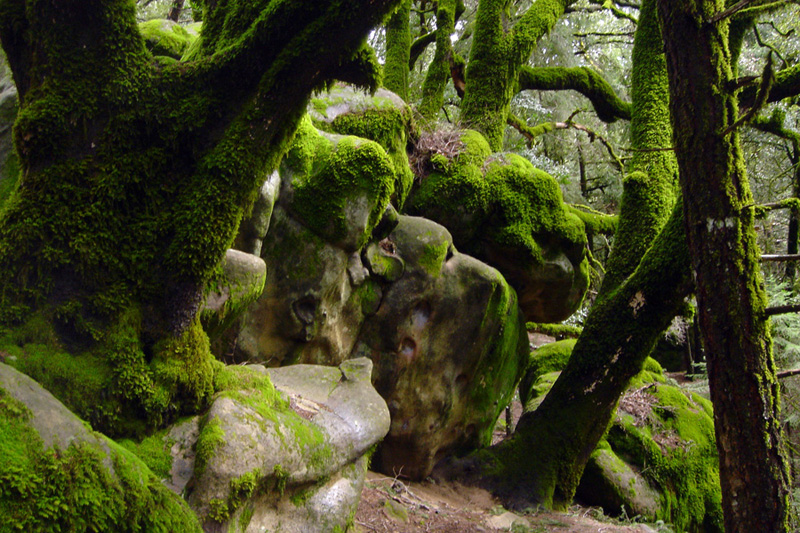
Bev was shocked, tearful, and remorseful although, Jory could tell, she was also more than a little proud of her day’s exploits, if those must be her last. He could understand her so very well. Looking down, he saw that his foot had merged into hers. They were flurbbing, losing their identities, fusing into a common wave function in order to fit their information into a dwindling amount of phase space. And soon, to make things worse, they were flurbbing into the wall and its alien ideations.
Jory sank to the tingling floor as everything grew indistinct. Staring up with his eyes like a pair of fried eggs in a puddle, he saw a series of gauzy four-legged forms—the ghosts of the cows who’d disappeared from Gunnar’s farm, eaten by the elves. In their wake limped a two-legged herdsman: the shade of his beloved uncle.
“How can I escape?” Jory asked Gunnar’s ghost.
“Love,” whispered Gunnar. “Only love can save you.”
With his last vestige of energy, Jory pulled his body free of the quantum foam and embraced Bev, long and true. He sensed every cranny of her ego-soul and how it complemented his.
Their bodies firmed up and, as they broke apart into non-flurbbed individuals once more, they found themselves above ground, amid the enchanted mushrooms, beneath the dark sky of a new moon.
For a time they merely drank in the plain fragrant air of their native domain, feeling rich and drunk on high-plane reality.
“I’d like to retire here with you, Bev,” said Jory eventually. “I can quit the game now and enjoy my pension. If only the property titles weren’t all screwed up. A fourth of this land is mine.”
“Elf Circle Farm,” said Bev. “I know all about the case. Like I said, I’m the county clerk. I can shuffle some papers, say a few words, and—zickerzack!”
So Bev and Jory married, and Jory took possession of his chosen portion of Gunnar’s land: the house, the creek, and the mushroom glen. They fixed the place up, and got a pair of cows for old times’ sake. Once or twice, Jory thought he detected a glitter of subdimensional ectoplasm in the barn where Uncle Gunnar had hung himself, but the shade spoke no more with his nephew. No need: Jory never again contemplated suicide.
In the evenings, comfortably tired from the light chores, he and Bev would sit around the crackling hearth drinking caraway-seed-flavored aquavit, spinning tales about Elfland, academia, and the Gold Country. Over time, Jory came to see himself as an incredibly wise and fortunate man, as did his new step-grandson Jack, who often came to visit in the summers.
Dropping the boy off, Jack’s mother Hilda always conversed pleasantly with Jory, realizing she owed him credit for her professional successes extending his rhizomal subdimension theory—not that she was ever able to replicate his antigravity breakthrough.
As for the alvar, they never returned—at least not to Elf Circle Farm.
And, oh, yes, Bev’s tail. It was there for good. During the first months of living on the farm, Bev hid the tail by wrapping it around her waist. But then, at Jory’s urging, she began letting it hang out. Her theater group approved.
---End---
About the Authors
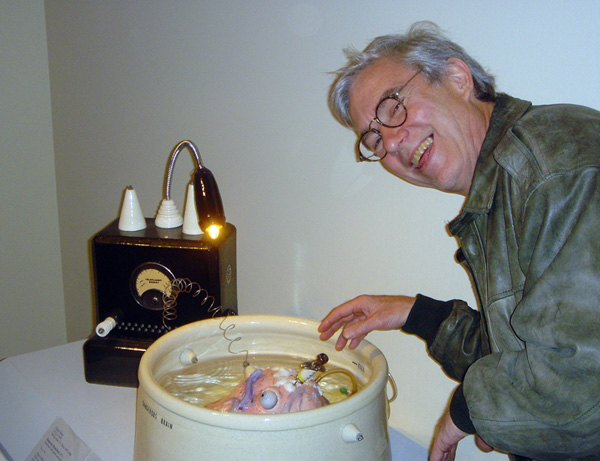
Born in Kentucky in 1946, Rudy Rucker moved to Silicon Valley when he turned 40. He recently retired from his computer science professorship at San Jose State University. He has published twenty-six books, primarily science-fiction and popular science. An early cyberpunk, he also writes SF in a realistic style that he characterizes as transreal. His most recent nonfiction book was about the meaning of computation: The Lifebox, the Seashell, and the Soul: What Gnarly Computaion Taught Me About Ultimate Reality, the Meaning of Life, and How to Be Happy; the paperback is out from Thunder’s Mouth Press this fall. Rucker’s latest novel is Mathematicians in Love, which gives SFictional life to some of his ideas about computation, out from Tor Books this fall. Rucker is currently working on a novel, Postsingular, which uses his recent Asimov’s stories “Chu and the Nants” and “Postsingular” as back-story. He spends an inordinate amount of time writing and photographing for his blog.
